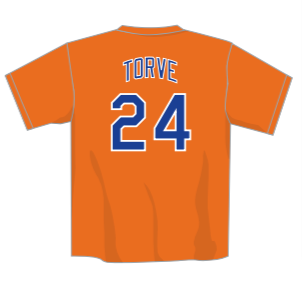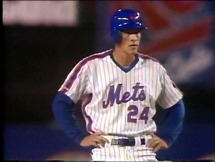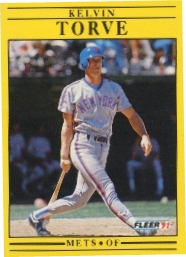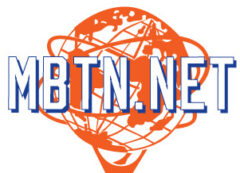
Below is a reprint of an interview with Kelvin Torve I’d done nearly 13 years ago and first published here. In light of the Willie Mays announcement yesterday it’s just as relevant but I want to note here the phrase I used in the headline then, “Accidental 24” I’ve come to believe was more of a clandestine experiment than a goof. I’ll have more to say about the Willie Mays situation soon.
Kelvin Torve was a journeyman ballplayer whose brief career with the Mets is remembered as much for his uniform as for his game. But his moment in history reveals much.
A 10-year minor-league veteran when called up to the Mets to replace an injured Kevin Elster in August of 1990, Torve became the unwitting victim of a procedural screw-up that gave him temporary custody of a uniform number that was supposed to have been kept under guard for one of the team’s immortals. For reasons unexplained to this day they gave him No. 24, a uniform that hadn’t been issued to a player since Willie Mays finished his career with the Mets in 1973.
Joan Payson, the Mets’ original owner and unabashed fan of the Say Hey Kid dating from his career with the New York Giants, had promised Mays the Mets wouldn’t issue No. 24 following his retirement. The succeeding Met ownership, however, never got around to officially retiring the number, leaving 24 in an uncomfortable state of limbo just waiting for a situation like Torve’s to arise. (They should retire it in honor of Mrs. Payson, is what they ought to do). Embarrassed as public outcry grew, the Mets shortly re-fitted the South Dakota native in No. 39.
Torve, who today [as of February 2018] works as a salesman for a packaging company and teaches at youth baseball clinics around his Davidson, N.C., home, for his part remains a good sport about his accidental casting in a freaky Met episode. In the following interview, parts of which were conducted for, and included in, the Mets by the Numbers book, Torve discusses his career including his moment as an overnight sensation in Willie Mays’ clothes.
 Tell me about your career leading up to the Mets.
Tell me about your career leading up to the Mets.
I was drafted by the Giants and played four years with them. I was traded to the Orioles and played three years with them, making it all the way to AAA. Signed as a free agent with the Twins and played two years with them, mostly in AAA and part of 1988 with the Twins in Minnesota. After that, I spent two years with the Mets.
When you played, were you mostly an outfielder or a first baseman?
Mostly, I was a first baseman. I dabbled in the outfield, mostly if there was a chance to get another first baseman who hit lefthanded into the game. I also went to Instructional League with the Twins to learn how to catch, but that lasted about six weeks, and I was never to darken the doors of catcherdom again.
I guess that was not all that unusual for a player like yourself who was in the game for a long time and trying to be as useful as you can be.
Right. And I appreciated the Twins for giving me that opportunity. I learned a lot, but it didn’t work out. The ultimate goal would have been for me to be a third catcher with somebody, be a pinch hitter, play outfield and first base and in an absolute emergency go back there and put on the catching gear.
 In your minor league career, you were a pretty good hitter [.303/.392/.453 in AAA Tidewater in 1990].
In your minor league career, you were a pretty good hitter [.303/.392/.453 in AAA Tidewater in 1990].
I hit well enough to be employed for 13 years. I was a good AAA hitter and had one good year in the big leagues with the Mets. My bat was what kept me in the game. I had a few opportunities but when you’re a minor leaguer for as long as I was you really have to make a splash immediately if you want to stay. The first year with the Mets, I did, and I got quite a few at-bats. The second year, I think I had only 8 at-bats. I hit the ball hard but didn’t get the breaks. That’s the way it goes.
You were a first baseman who didn’t hit many home runs.
That was the knock on me. I was a first baseman who didn’t hit enough home runs. But the Mets at that time had a guy at first base, Dave Magadan, who didn’t hit many home runs either. They at least had the foresight to challenge that stereotype. In baseball, like in a lot of careers I suppose, if you get a label like that, it’s hard to lose.
I wonder if you can set the scene for me. You’re called to the Mets in 1990 and issued a jersey for the first time. What do you recall about it?
![]() Nothing out of the ordinary. I just got there and saw a locker with my uni in it, No. 24. I didn’t give a second thought to it. I don’t know who assigned the number, it might have been Charlie Samuels but I’m not sure. I guess they didn’t give much thought either.
Nothing out of the ordinary. I just got there and saw a locker with my uni in it, No. 24. I didn’t give a second thought to it. I don’t know who assigned the number, it might have been Charlie Samuels but I’m not sure. I guess they didn’t give much thought either.
They didn’t ask you if you had a preference?
Oh, no.
So you’re in a situation where they take what they give you.
Yes. I had spent a long time in the minors. I was just happy to be there. I would have taken two-point-four if they’d asked me to.
![]() When do you become aware that there’s some kind of outcry?
When do you become aware that there’s some kind of outcry?
When I was called up we had a homestand with the Phillies and I think, the Cubs. Then we went on the road, to California, and while we were out there Charlie came up to me and said, “Listen, we made a mistake with your number. Some people have been calling in and writing in. So we’d like to change your number.”
I just said, “Shoot, that’s fine with me.” I didn’t want to be a pain about it. And I guess they wanted to keep it low-key, not make a big deal about it. So I just started wearing No. 39 from that point on.
Did you have any preference as to what number you would have wanted?
Not really. I’d played so long in legion ball and college and the minor leagues. I think I’d worn every number there was. I didn’t have any preference at all.
Did you hear anything from the fans, or pick up on it, while you were at Shea?
No, I didn’t. That’s not to say they weren’t yelling at me – just that I didn’t hear anything. The first time I was aware of it we were on the road and Charlie came up to me in the locker room and told me that’s Willie Mays’s number, so we have to change it. And I said, that’s fine.
I looked it up, and you were batting better than .500 in the No. 24 jersey.
Hopefully I did OK in it, because I know Willie Mays did it proud as well.
You played briefly with the Mets again in 1991, then to Japan, correct?
 Two years, I played for the Orix Blue Wave. It was a good time. I’m nostalgic when I look back on that time, but while you’re over there it can be frustrating the way they play the game. It’s different than in the United States, and you’re a long way from home. But after leaving Japan, reflecting on it, I realize how much I did enjoy my time there, what it a blessing it was.
Two years, I played for the Orix Blue Wave. It was a good time. I’m nostalgic when I look back on that time, but while you’re over there it can be frustrating the way they play the game. It’s different than in the United States, and you’re a long way from home. But after leaving Japan, reflecting on it, I realize how much I did enjoy my time there, what it a blessing it was.
I was a teammate of Ichiro over there. When I was there he was a rookie. He was so young he rode his bicycle to the games!
Could you tell at the time he would accomplish as much as he has?
Yes, though back then nobody from Japan was coming to the United States. Watching him play you would say, it’s too bad they don’t because this kid could play in the big leagues. He was 18 at the time and the only thing he couldn’t do well then was throw, and he’s obviously gotten a lot better throwing since then. You could tell he was going to be really good.
What about your time with the Mets do you remember most?
I recall it as a good time because I was in the big leagues. My first at-bat, I got hit by a pitch. My second at-bat, I hit a double that knocked in a few runs [pinch-hitting in a contentious game featuring a Phillies-Mets brawl]. The morning after that I get a call that there’s some policemen waiting to see me in the lobby of the hotel.
Turns out a sports talk radio show had talked about me getting called up, being a kid from the prairie in South Dakota, and being in the big city for the first time. These New York City cops heard that and showed up at my hotel and gave me an escort to the ballpark! They said, we hear you might need help. It was all good natured. I got to be good friends with one of those cops and his family, a guy by the name of Al Weinman. We kept up with Al for years after that.
